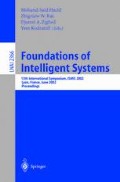Abstract
The adoption of the object identity bias for weakening implication has lead to the definition of OI-implication, a generalization model for clausal spaces. In this paper, we investigate on the generalization hierarchy in the space ordered by OI-implication. The decidability of this relationship and the existence of minimal generalizations in the related search space is demonstrated. These results can be exploited for constructing refinement operators for incremental relational learning.
Access this chapter
Tax calculation will be finalised at checkout
Purchases are for personal use only
Preview
Unable to display preview. Download preview PDF.
References
L Badea and M. Stanciu. Refinement operators can be (weakly) perfect. In S. Džeroski and P. Flach, editors, Proceedings of the 9th International Workshop on Inductive Logic Programming, volume 1634 of LNAI, pages 21–32. Springer, 1999.
F. Esposito, N. Fanizzi, S. Ferilli, and G. Semeraro. A generalization model based on OI-implication for ideal theory refinement. Fundamenta Informaticae, 47:15–33, 2001.
F. Esposito, N. Fanizzi, S. Ferilli, and G. Semeraro. OI-implication: Soundness and refutation completeness. In B. Nebel, editor, Proceedings of the 17th International Joint Conference on Artificial Intelligence, pages 847–852, Seattle, WA, 2001.
G. Gottlob. Subsumption and implication. Information Processing Letters, 24(2):109–111, 1987.
G. Gottlob and C.G. Fermüller. Removing redundancy from a clause. Artificial Intelligence, 61:263–289, 1993.
P. Idestam-Almquist. Generalization of clauses under implication. Journal of Artificial Intelligence Research, 3:467–489, 1995.
R. Khardon. Learning function-free Horn expressions. Machine Learning, 37(3):241–275, December 1999.
Jörg-Uwe Kietz. A comparative study of structural most specific generalisations used in machine learning. In Proceedings of the Third International Workshop on Inductive Logic Programming, pages 149–164, Ljubljana, Slovenia, 1993. J. Stefan Institute Technical Report IJS-DP-6707.
S.-H. Nienhuys-Cheng and R. de Wolf. Foundations of Inductive Logic Programming, volume 1228 of LNAI. Springer, 1997.
M. Schmidt-Schauss. Implication of clauses is undecidable. Theoretical Computer Science, 59:287–296, 1988.
Author information
Authors and Affiliations
Editor information
Editors and Affiliations
Rights and permissions
Copyright information
© 2002 Springer-Verlag Berlin Heidelberg
About this paper
Cite this paper
Fanizzi, N., Ferilli, S. (2002). Minimal Generalizations under OI-Implication. In: Hacid, MS., Raś, Z.W., Zighed, D.A., Kodratoff, Y. (eds) Foundations of Intelligent Systems. ISMIS 2002. Lecture Notes in Computer Science(), vol 2366. Springer, Berlin, Heidelberg. https://doi.org/10.1007/3-540-48050-1_17
Download citation
DOI: https://doi.org/10.1007/3-540-48050-1_17
Published:
Publisher Name: Springer, Berlin, Heidelberg
Print ISBN: 978-3-540-43785-7
Online ISBN: 978-3-540-48050-1
eBook Packages: Springer Book Archive

